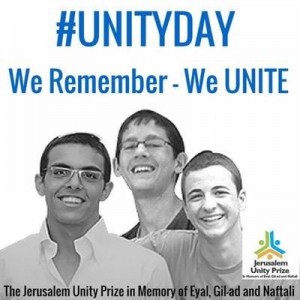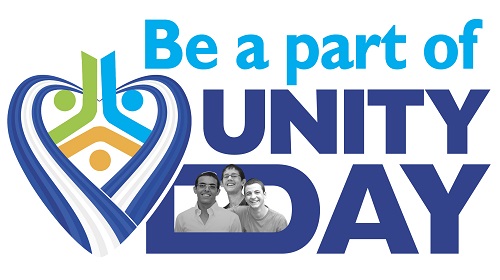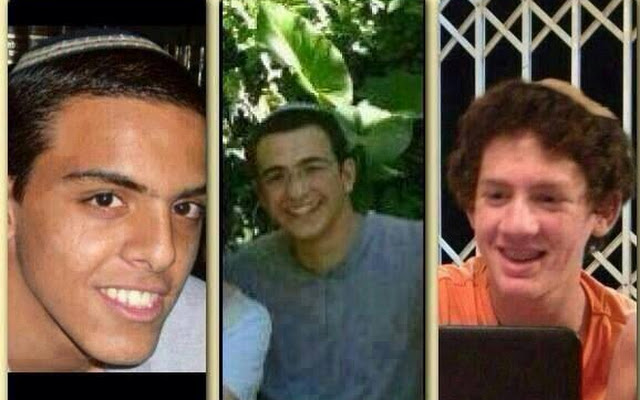
On 15 Sivan, 5774, Naftali Fraenkel, 16, Gilad Shaer, 16, and Eyal Yifrah, 19, were kidnapped and murdered on their way home from yeshiva.
And here we are, one year later. One year after that terrible day when we heard of the kidnapping of the three beautiful boys. One year after those harrowing weeks when all we could think of was how precious each Jewish child is. One year after that period of tragic bliss, when each and every Jew felt a deep and profound love and connection to each and every other Jew. One year after a time when all of us recognized the searing truth of our shared fate and our shared destiny.
Has the year changed us?
We all wish it had changed us more. But today we are faced with two choices. We can choose to dwell on what hasn’t changed, and beat ourselves up over how the clearest of wake-up calls seemed transformative for a week or two before we slid right back into whatever destructive patterns we were in before. Or we can choose to revisit and reignite the positive feelings and perspectives that last year’s tragedy stirred in us, hoping – and knowing – that every stirring of those feelings will contribute to making us stronger and better as people and as a People.
So please, take a few minutes and join me to revive the clarity and the commitments we made during those unforgettable days.

First, we recall the incredibly firm faith of the mothers and families of the three boys. The dignity and grace with which they faced – and continue to face – their unspeakable challenge has served as an inspiration to us. And we know that what helped them greatly was – and is – the feeling that Klal Yisrael had gathered together beside and behind them. In the words of Racheli Fraenkel:
“This tragic story has shaken us up and brought us together, uncovering for an extended moment the shared foundation of our existence here — our Achva, our brotherhood.”
The core foundations of Emunah – faith – are profoundly strengthened by Achva – brotherhood and caring. We know that Bitachon – trust in G-d – does not mean that we will always merit the happy and hoped-for ending, or, as Mrs. Fraenkel put it, “Hashem is not our employee Who responds to our every request.” What it does mean is that what happens to us does not just “happen”; that we each have a Destiny, and that Hashem is with us in all that we experience, for better or R”L for worse. That we are never alone.

And so, watching the mothers and families of the boys, we understood the integral relationship between community and faith. We understood that when we feel alone and forsaken down here, by our fellow man, it is hard to feel the closeness of G-d. And that the more we as individuals and as a community embrace each other, the happier and the more connected all of us feel to the destiny of Klal Yisrael and to Hashem.
And so we committed to reach out to each other, to strangers, with more warmth and more friendliness, in a way that will inevitably strengthen both our sense of community and our faith.
Second, we recall the feeling of how precious every one of us is. We recall how last summer, as in the days of Avraham’s battle to rescue his nephew Lot (Bereishis 14:14), or Moshe’s battle with the Canaanites to liberate a single hostage (Bamidbar 21:1), our sophisticated army was mobilized day and night for the return of “just” three teenage boys. And we realized that our growth has come at a price; that there are so many of us (bli ayin hara!) that we do not cherish each other enough. That when we meet each other in an airport in Texas or in China we greet each other as long lost brothers, but in our own streets, stores, shuls or schools teeming with Jews we sometimes do not even see each other.
And so we committed to make our city back into a small town, where everyone knows everyone or acts as if they do.
And third, we recall that what we all cherished most during that trying time was the incredibly positive feeling we had from the rare experience of a unity that transcended all the usual groupings in Klal Yisrael. During that time, we all had a chance to reach out and to say to Klal Yisrael that we love them. Not as an introduction to telling them “but…” as we go off on yet another principled critique of their outlook or lifestyle. Just plain: “We love you; we are brothers and sisters,” with no ifs, ands or buts.
There is so much that we say to each other, about each other, or at each other about all our principles and opinions, but we rarely take the opportunity to express how much we love each other. And so we have grown apart. We feel alienated from fellow Jews whose outlook or lifestyle does not line up with ours, and we really don’t like that.
And so we committed to reach out to more people — whether walking in the street, at shul, at the store or the gas station, and say “hello” — especially to those who don’t look like us and who may be insecure about how we feel about them.
So here, one year later, let us remind ourselves of the precious insights and feelings we gained one year ago.
And let us commit again to make ourselves back into a small town; to reach out to each other, show care for each other and get to know each other, especially when we are a bit different from each other.
And as we realized then, we need the practice. Because the day will come very soon when we won’t be able to choose the shul we daven in or don’t daven in; the minyan we go to or wouldn’t step into. The day will come very soon when we all will be going to one big beautiful shul, our glorious Bais HaMikdash. We are going to go there whether the service is fast or slow, whether they sing a lot or a little, and we are going to be there with everyone — those we have chosen to sit with in the past and those we have not. So why don’t we start now and get comfortable with each other, wherever we feel we “belong,” because in the end, we all belong together.
This message is being shared in conjunction with Unity Day 2015, a worldwide effort in the Jewish community to mark this Wednesday, June 3rd as a day of focus on the lessons learned from last year’s tragedy.
Partners in Torah was asked to create a curriculum that can be made available to anyone interested in participating by learning something in their memory. It is available here as a free download: www.partnersintorah.org/unityday
Rabbi Moshe Hauer is the Spiritual Leader of Congregation Bnai Jacob Shaarei Zion in Baltimore, Maryland. Rabbi Hauer is active in local communal leadership in many areas, with an emphasis on education and social service organizations serving the Jewish community. He is a founding Editor of the online journal “klal Perspective” and leads a leadership training program for rabbis and communal leaders. He lectures on a wide variety of topics in Jewish law and thought, including support groups for families and individuals facing traumatic illness, infertility and special needs.



















